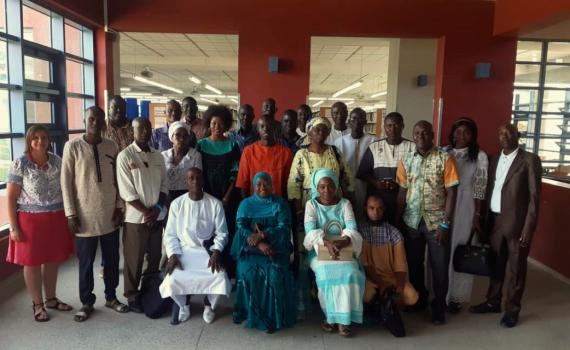
BACKGROUND
The EIFL Open Access Programme began raising awareness about open access in Senegal in 2010 when, with our partner consortium, COBESS (Consortium des Bibliothèques de l’Enseignement Supérieur du Sénégal), we organized the first open access workshop in Dakar. The workshop brought together researchers, students, librarians, ICT staff and legal experts.
In 2013, As a result of the workshop, the Rector of Cheikh Anta Diop University of Dakar (UCAD), which is the oldest university with the largest number of professors and academic staff in Senegal, issued Circular No. 721 addressed to deans and directors of research institutes inviting candidates applying for evaluation and promotion at CAMES (Conseil Africain et Malgache pour l'Enseignement Supérieur) to register and deposit their articles and theses and dissertations in a digital library, which serves as an institutional OA repository.
Dakar is also the headquarters for CODESRIA (the Council for the Development of Social Science Research in Africa), and EIFL had the opportunity to raise awareness about OA policies, repositories and journal platforms to a wider audience at the Fourth CODESRIA Conference ‘The Open Access Movement and the Future of Africa’s Knowledge Economy’ on 30 March - 1 April 2016. Delegates to the conference adopted the ‘Dakar Declaration on Open Access Publishing in Africa and the Global South’, which calls on scholars/researchers and students, policy makers and other stakeholders to undertake research and share findings of research that will improve the quality of people’s lives.
EIFL gave a keynote address at the first open science conference in Africa, held in Dakar from 23 - 25 October 2019. The conference, themed ‘Open Science in the South. Issues and Perspectives for a New Dynamic’, released the ‘Declaration for the Sharing and Opening of Research Data for Sustainable Development’ [in French].
ACTIVITIES
- Awareness raising and advocacy workshops on open access; research evaluation; open access policies, and repositories.
- Training for librarians and ICT staff to manage open access repositories.
TIMELINE
2010 - 2022
ACHIEVEMENTS
- Université Cheikh Anta Diop de Dakar set up an OA working group which is developing an OA policy.
- High-level researchers and research administrators from the Université Cheikh Anta Diop de Dakar are now leading the OA movement in Senegal. They are advocating for OA, encouraging other researchers to practise OA, digitizing research outputs and making them openly available in the institutional repository.
- Librarians and ICT staff have knowledge and skills to develop OA policies and set up institutional repositories. Université de Thiès and Université Virtuelle du Sénégal are about to launch their open access repositories and more COBESS members are preparing to set up repositories.
- Increased visibility of research, through four institutional OA repositories:
- The African Institute for Economic Development and Planning (IDEP) Document Server with 23,186 documents (by the end of December 2021).
- UCAD digital library with 20,058 documents (by the end of December 2021).
- L'Université Assane Seck de Ziguinchor (UASZ) with 1,009 documents (by the end of December 2021).
- L’École supérieure polytechnique with 321 documents (by the end of December 2021).
- CODESRIA publishes all their books, journals and reports in open access, and makes theses and dissertations openly available. There were -
- 10 OA journals (by the end of December 2021): Afrique et développement, Revue africaine de sociologie, Revue africaine des affaires internationales, Afrika Zamani, Identité, culture et politique, Revue de l’enseignement supérieur en Afrique, Revue africaine des livres, Revue africaine des médias, L’anthropologue Africain and Méthod(e)s: Revue africaine de méthodologie des sciences sociales.
- 180 monographs (by the end of December 2021).
- 1,387 theses and dissertations (by the end of December 2021).





